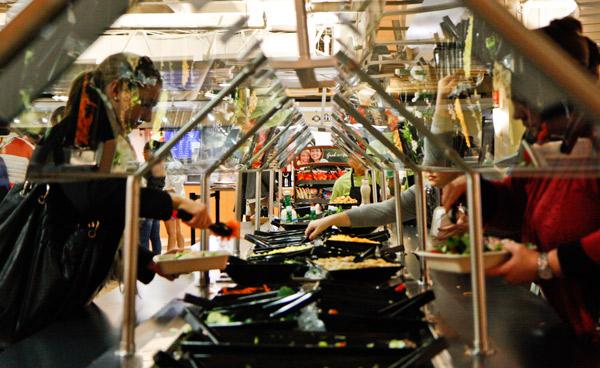Updated: Feb. 18, 2015 at 6:04 p.m.
Leftover grease in J Street is now being turned into a clean source of diesel.
GW is partnering with Standard Biofuels, an oil collection and transformation systems company based in Washington state, to turn 100 percent of used oil into renewable fuel, general manager of campus dining Bernadette Thomas said. The process started this semester, after the campus dining venue signed on to recycling extra cooking oil from fryers.
The University’s food manager, Sodexo, joined J Street in the nationwide PURE program designed by shortening and oil producer Ventura Foods and Standard Biofuels. PURE partners with restaurants and university dining halls to collect every gallon of used vegetable oil from fryers to turn into biodiesel.
Since the end of last semester, local Standard Biofuels partners have picked up gallons of cooking oil from GW loading docks, Thomas said.
Used cooking oil is collected, recycled and made available for redistribution, the company’s service manager, Noah Perry, said. The fuel company supplies biodiesel to industrial companies, trucking companies and boiler heaters, and collects oil from more than 100 universities across 40 states, Perry said.
Participating PURE oil customers receive a discount on qualifying cooking oil when they purchase the products, regardless of how much they recycle after cooking use. In other oil recycling programs, customers purchase cooking oil from various sources, and how much extra oil they collect determines the rebate they receive.
“Right off the bat there’s a guaranteed savings to the client,” Perry said. “Other companies operate on honor system where they have nothing to do with cooking oil. They just get the oil and pay a client based on what they report they’ve collected. This way we know they didn’t just throw it away.”
Thomas declined to say how much of a discount GW gets on its cooking oil purchases from participating in the PURE program.
University President Steven Knapp has committed to making GW more sustainable over the next decade. Officials have laid out plans to add green spaces to campus, reduce carbon emissions and become a zero-waste school through composting and recycling.
Standard Biofuels converts all of its oil into diesel that the company then sells domestically, lowering several industries’ dependence on foreign oil, Perry added.
The University of Alabama began recycling fryer oil about six years ago, the institution’s Executive of Sustainability Logistics Tony Johnson said. Some of GW’s peers, including American University and Washington University in St. Louis, have been recycling excess oil from dining halls since 2009.
The University of Alabama is also partnered with Standard Biofuels to recycle used oil. The process is cost-effective for large institutions like universities, Johnson said.
“A lot of universities don’t realize just how much money they could be making off of recycling stuff like this,” Johnson said.
While GW will save money from recycling cooking oil with the discounts it gets from the PURE program, Loyola University of Chicago spends money to collect extra oil from a variety of donors and allow students to convert the oil themselves. Other universities and businesses in the Chicago area donate oil to the university for students to turn into biodiesel for their campus shuttle system, biodiesel lab manager Zach Waikman said.
“There is a really great opportunity to capture locally. It’s a pretty straightforward process that a lot more colleges could definitely do,” he said.
This post was updated to reflect the following corrections:
The Hatchet incorrectly reported that unused oil from J Street is being turned into renewable fuel. It is actually used oil. The Hatchet also incorrectly reported that Standard Biofuels has picked up the oil every day. It has not necessarily been picked up every day. We regret these errors.







